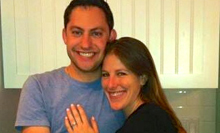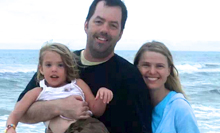Can these 4 couples really afford their dream houses?
Four couples, four home purchases, four expert opinions

A free daily email with the biggest news stories of the day – and the best features from TheWeek.com
You are now subscribed
Your newsletter sign-up was successful

For many of us, buying real estate is one of life's biggest milestones.
Whether it's purchasing your first home, a bigger home, or an investment property, it's critical to have your financial ducks in a row before you dive in. Or as someone who handles real estate for a living puts it:
"Buyers should carefully assess their finances before beginning their home search," says Steve Brown, president of the National Association of Realtors. "By looking into their income, savings and credit reports, and collecting documentation of income and cash available, they can help avoid future problems when they're trying to qualify for a mortgage."
The Week
Escape your echo chamber. Get the facts behind the news, plus analysis from multiple perspectives.

Sign up for The Week's Free Newsletters
From our morning news briefing to a weekly Good News Newsletter, get the best of The Week delivered directly to your inbox.
From our morning news briefing to a weekly Good News Newsletter, get the best of The Week delivered directly to your inbox.
Want to know how much house you can potentially afford — and what pitfalls to avoid when you begin looking?
LearnVest spoke with four couples from across the U.S. who are looking to purchase real estate in the near future, as well as David Blaylock, a CFP® with LearnVest Planning Services, who weighed in on how each couple can better prepare for this important next step.
The first-time homeowners
Who: Steve Thomas*, 28, a software salesman and his wife, Sally, 29, who is looking for work as a Korean translator.
A free daily email with the biggest news stories of the day – and the best features from TheWeek.com
Location: San Jose, Calif.

What they want to buy: We're looking to buy our first home together sometime in 2016. Ideally, the house will have two bedrooms, two baths, and be located in a safe, quiet neighborhood within ten miles of work (preferably five so we can ride our bikes, save on gas, and get some exercise).
The home doesn't have to be turnkey, but we don't want to have to do many repairs either. We have no children and aren't planning on having any — but things could change, who knows.
Because of the high cost of real estate in San Jose, we're considering moving to an area with similar weather and a lower cost of living. Sacramento, Houston, Austin, or somewhere in Florida are all in the running.
We're looking at spending $200,000 or less on a house. If we do get a mortgage, we'd like to pay it off in no more than 15 years. We don't buy anything unless it's on sale, and our house won't be different. I actually blog about my frugal ways at Steveonomics.
Where they stand: We should have $100,000 liquid at the end of next year. Our rent is reasonable — we have a great deal on a one-bedroom through a friend — so I don't feel there's a huge rush to jump into a big mortgage. If we save aggressively, we should have enough cash if we spot a great deal.
I should make about $70,000 this year (close to half of my salary is based on commission). When my wife starts working, most of her salary will go toward savings. We're aiming to spend around $20,000 this year on living expenses. We currently have $50,000 saved for a down payment.
Outside of retirement accounts we only hold cash. We don't want to risk a market crash a few years before we're planning to buy a house. After we own a house, I can see us taking more risks with stocks.
We have no debt whatsoever. Our modest student loans were quickly paid off and we bought our car with cash. I use credit cards for almost every purchase to earn miles and fly for free throughout the year.
I plan to max out my 401(k) and have already maxed out my traditional IRA with my tax refund. This lowers our available cash, but makes it so I pay very little tax. My wife maxed out her traditional IRA with Vanguard last year even though she didn't work. She will probably max it out this year and put at least some money in a 401(k) if it's available to her. We currently have $20,000 in retirement accounts.
If I were to lose my job tomorrow, we could support our current lifestyle for close to three years without any assistance. Our emergency fund would be our bank accounts (which is also our housing savings).
What the CFP® says: What an exciting time; plans to buy a first home and a possible move to a new city. I think it's a great idea to consider buying in a location that may provide more bang for this couple's buck. I do recommend they consider purchasing a home that has at least three bedrooms, especially if they're considering possibly starting a family. It could also help increase the home's desirability when it comes time to sell.
The couple's desire to have around $100,000 in liquid savings is a great goal. They currently have about $50,000, which should give them at least a 20 percent down payment and six months worth of living expenses for their emergency fund. With mortgage rates being very reasonable at this time, I recommend they consider a 15-year fixed mortgage for the remaining part of the purchase price instead of paying cash (while a 30-year fixed mortgage is OK, a 15-year is typically ideal).
I also suggest that any extra money they're able to save should be added to their retirement account balances to help make sure they're on track in that area as well. At their income level I would also recommend that they use Roth IRAs instead of Traditional IRAs to create tax-free dollars at retirement.
The investment-property seekers
Who: Dan Sharma*, 29, a finance manager, and his wife, Samantha, 31, a middle school teacher. They have a 4-month-old son.
Location: Columbus, Ohio

What they want to buy: An investment property — preferably a condo — in Columbus/Central Ohio in the next one to two years.
We plan on renting the property to my in-laws in the short term and using it as a rental property in the long term. As we'll initially be renting to family members, we'll have them pay enough rent to cover the mortgage payment, so our only gain in the short-term would be appreciation, not positive cash flow.
Our priorities for the property are location, property taxes, number of bedrooms, and age of the property.
Where they stand: We currently have $10,000 saved for a down payment and are aiming to have $30,000 to $35,000 by the time we make the purchase. We'll be considering properties in the $150,000 price range.
Combined, we make $140,000 a year. We pay our credit cards off monthly and owe $7,000 this month. We don't have any student loans, but we do have an installment loan for our SUV on which we pay $600 a month.
We currently live in a single family new-build that we bought in 2012, the year we got married. Our current mortgage is $336,020, and our monthly payment is $1,733.
Samantha and I have $80,665 total in retirement savings. Samantha has $28,539 in her pension (even though her final pension will be calculated off her salary). My public retirement account, which functions as a 401(k), has $35,474 held in index funds, and 85 percent are in stocks. The same is true of my 403(b), which has $16,652 in it.
We currently have five to seven months saved in emergency savings.
What the CFP says®: I'm so glad to see that Dan and Samantha have retirement assets and sufficient emergency savings. It also seems like they want to make sure they have an adequate down payment for this investment property.
Given their monthly household expenses, it seems like adding an extra real estate expense could put a strain on cash flow. Dan and Samantha should consider what sacrifices they'll have to make to pay the monthly mortgage on an additional property. My concern is that they're making an investment that they may not be able to afford in the event they're unable to rent the property at full market value.
Since it could be some time before the property begins to make a profit, this might not be the best use of their capital and could expose them to risk should the housing market take a dive or if they need to sell at an unexpected time.
It's important that they consider the full carrying cost of the property (mortgage, insurance, taxes, maintenance, repairs) versus the rent received to determine whether the property will be cash flow positive, neutral, or negative. If it's negative, they might want to consider a less expensive home or putting more cash down to get the expected cash flow to at least neutral.
The newlyweds
Who: Eric Rosenberg, 29, a senior financial analyst, blogger, and web designer (who also owns Denver Flash Mob, a flash mob planning company), and his fiancée, Jennifer Nadel, 34, a property management and real estate professional.
Location: Portland, Oregon

What they want to buy: We've lived together for over a year, and with our upcoming wedding on May 18, we're looking forward to buying a house in Portland where we'll start a family together.
We want a place that's comfortable enough for family to visit and to handle our own growing family (when it comes), but nothing so expensive that it makes us "house poor" or puts us under serious financial pressure.
We moved to Portland last December and have a one-year lease on a rental. We want to avoid making two payments at once, so we're currently getting a feel of the market and hope to make a purchase around the end of this year or very early in 2015.
Location is one of the most important features for us. We want to live in an area with walkable restaurants, shops, and entertainment. I work in a Portland suburb, and we want to have amenities nearby while minimizing my commute. We need a home with three-plus bedrooms, two-plus bathrooms and a yard for the dogs (we have two).
Where they stand now: We have about $20,000 in cash that we can quickly tap into, but once the condo I own in Denver sells, we're expecting to have at least $100,000 saved for a down payment.
We know we're living in a hot market with low vacancies, and understand we'll have to spend a big chunk to get what we want. We're looking at homes in the $300,000 to $400,000 range, based on our savings and spending goals. I'd love to save enough to buy in cash, but at the very minimum we want to have 20 percent — or $60,000, on the low end — saved to avoid private mortgage insurance.
Our combined income is currently around $100,000 per year.
We've worked hard to pay off all of our debt other than the mortgage on my condo in Denver, which is currently for sale. The condo mortgage has a balance of about $93,000. It's currently under contract, so if the sale goes through, I'll be 100 percent debt-free by the end of April.
We have about $60,000 in retirement savings. Most of that was accumulated in employer 401(k) plans, but the majority of the balance is now in a rollover IRA and Roth IRAs.
In addition to the retirement accounts above, I have an investing account with about $7,000 in it. The balance has been higher in the past, but I sold almost everything when I bought the Denver condo to make a down payment.
We have a savings account with about six months of living expenses that could cover us in case of an emergency.
What the CFP® says: What a great job Eric and Jennifer have done to get prepared to make a home purchase. They've paid off almost all of their debt and have a sufficient emergency fund ready in case the unexpected occurs.
My one concern is that the home could cause Eric and Jennifer to be unable to contribute the appropriate amounts to their retirement due to an expensive mortgage. This couple should work to make sure that their future mortgage payments are between 30 to 36 percent of their net income.
In order to meet this goal, they may need to sacrifice some of their list of wants such as location, size, or amenities or push out their timeframe to save more. The great news is that it seems they'll have a sufficient down payment of at least 20 percent, but they should make sure that the mortgage payment is not too large for their monthly budget.
The twofers
Who: Mark Daley, 44, is an IT analyst/PM and his wife, Magdalena, 42, is a preschool educator. They have a 5-year-old daughter.
Location: Charlotte, N.C.

What they want to buy: We're looking to buy a two-plus bedroom duplex in a popular area of Charlotte as an investment property in the next month or two. Our goal is to build retirement wealth long-term.
Our main priority with this investment is to have the rent we charge be at least 1 percent of the total purchase price. We plan on managing the property ourselves.
In addition to an investment property, we're also looking to buy a house in Charlotte as a primary residence sometime this year. We plan on buying versus renting because of the investment aspect. Our priorities are location (we'd like to be close to work and our daughter's school) and number of bedrooms (three-plus).
Where they stand now: We have $3,000 saved for a down payment, but are aiming to have $5,000 by the time we make the purchase. We're looking to spend approximately $100,000 on the income property.
We currently don't have anything saved for a down payment on a primary residence, but are aiming to have $10,000 by the time we make the purchase. We're looking for a house in the $200,000 price range.
Our combined income is $90,000 a year. We have $8,000 left on our student loans, $7,000 on our car loan, and $200 worth of credit card debt.
We've been renting a three-bedroom house for the past three years and currently pay $900 a month in rent.
Magdalena and I don't have retirement savings yet, but we're getting ready to open two Roth IRAs.
Our emergency fund would cover our current lifestyle for three months.
What the CFP® says: I'm proud of Mark and Magdalena for having goals and dreams. This is the first step in making financial progress. There are, however, a few things I think they should do prior to purchasing a home or investment property.
First, they should strive to get at least six months' worth of emergency savings built up. This may help them manage the unexpected costs associated with home-ownership. They also should work toward having a sufficient down payment of 20 percent of the purchase price, if possible. This can help them avoid costly mortgage insurance premiums.
The monthly mortgage on a $200,000 home will probably be more than what Mark and Magdalena are currently paying in rent, so they should also make sure that payment fits inside their current monthly budget. To figure out how much house they can afford, they can multiply their gross income by 2.5 (which is a loose calculation) or have a close look at their expenses and run them against their take-home income to see what might fit comfortably in the family budget.
I'd also recommend they hold off on the purchase of investment property until they're sure they're able to manage the mortgage on a primary residence. They could instead focus on using their investment dollars to help fund their retirement accounts.
*Names have been changed.
This story was originally published on LearnVest. LearnVest is a program for your money. Read their stories and use their tools at LearnVest.com.
More from LearnVest...
-
 How the FCC’s ‘equal time’ rule works
How the FCC’s ‘equal time’ rule worksIn the Spotlight The law is at the heart of the Colbert-CBS conflict
-
 What is the endgame in the DHS shutdown?
What is the endgame in the DHS shutdown?Today’s Big Question Democrats want to rein in ICE’s immigration crackdown
-
 ‘Poor time management isn’t just an inconvenience’
‘Poor time management isn’t just an inconvenience’Instant Opinion Opinion, comment and editorials of the day